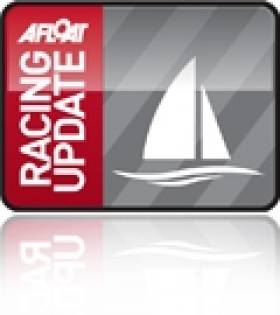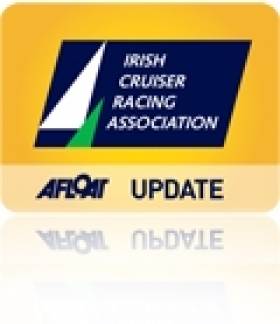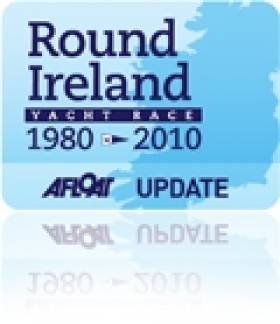Displaying items by tag: Offshore
Shinners go for Third Newport/Bermuda Win
The Cal 40 crew of Sinn Féin are looking for their third consecutive Newport-Bermuda scalp this year, with a hat-trick a very real prospect. In 46 races since 1906, just three boats have won the major prize, the St. David’s Lighthouse Trophy, at least two times. A pair of these boats won consecutive races – Carleton Mitchell’s fabled Finisterre in 1956-60 and, in the two most recent races in 2006 and 2008, Peter S. Rebovich’s Sinn Fein, from New Jersey’s Raritan Yacht Club. Rebovich and his usual crew will be back again this year with the gleam of a third St. David’s Lighthouse Trophy in their eyes.
How does this 45-year old stock Cal 40 sloop do so well, so often against much newer and more sophisticated custom boats? The explanation is that this is a happy marriage of a good boat to an able amateur crew that has been racing her for decades. During Finisterre’s glory days half a century ago, one of her regular crew credited Mitchell’s “good admiralship” – meaning his cheerful but firm, detail-driven, open-minded command of a deeply loyal crew. The same can be said of Pete Rebovich and his guys.
One thing that cannot be said about them is that they’re riding a brief lucky streak. When Sinn Fein first raced offshore in the Marion to Bermuda Cruising Yacht Race in the 1980s, she won class and family prizes. She’s sailed six Newport Bermuda Races, paying her dues with low finishes before winning her class in 2002 and 2004 and then taking the St. David’s Lighthouse Trophy, first in a drifter in a glassy sea in 2006 followed by a classic upwind thrash to the Onion Patch in 2008. Over Memorial Day weekend, she won her class in the 2010 Block Island Race, the major tune-up for the Bermuda Race.
Sinn Fein has also won the Olin J. Stephens Ocean Racing Trophy three straight times – in fact, the only times it has been presented – for the best combined performance in successive Newport Bermuda Races and Marblehead to Halifax Ocean Races. Rebovich has a special memory of winning the first Stephens Trophy because the presentation of the award to the 70-year-old winning skipper was made by 99-year-old Olin Stephens himself. “We won, and while I was hobbling to the stage to meet him and receive the trophy, he commented, ‘Isn't it nice to see an old guy, like me, still out there racing – and winning.’”
Full article on the official race website, HERE.
All Round Fastnet in Normandy Channel Race
Having tacked down the southern seaboard of Ireland after rounding Tuskar Rock, all boats in the Normandy Channel Race have now rounded the Fastnet and are heading east on the homeward leg. The Normandy Channel Race is one of many that visit Irish waters without stopping, with the Mini Fastnet and others dipping into our territory to find a high-profile rock before fleeing again.
The 8 competitors are making for the Scilly Isles, a string of rocks scattered about the South-West tip of England. To the great delight of these sailors, the fog, which has been tenaciously clinging onto them for the past three days, is gradually dissipating the further South the Class 40s sail. However, little else has changed and they’re still canted over against the wind as they make headway towards the English Channel and Normandy.
Antix Wins ICRA's Cork to Dublin Offshore
Cork Harbour saw the start of the feeder race to Dun Laoghaire for the Liebherr ICRA Nationals last Friday writes Claire Bateman. This race was mandatory for yachts wishing to compete in the Commodore's Cup to be held in the Solent in August and also served as a qualifier for any yacht wishing to compete in the Round Ireland Race from Wicklow in June.
This was the first opportunity the Irish team of Anthony O'Leary's Antix, David Dwyer's Marinerscove.ie and Andrew Creighton's Roxy 6 have had to sail together as Roxy, the yacht to fill the Class Three slot, only arrived in Cork Harbour fresh from the Dale-Nelson Yard in Wales two weeks ago.
Start photographs here.
Conditions on Friday night as the yachts came to the start line were magnificent. The harbour was resplendent bathed in brilliant sunlight with yachts from the Friday night Whitesail league flying everywhere in the 12-15knot NNW wind. The feeder race start saw the competitiors beat in the harbour to No.10 buoy where spinnakers were hoisted and they then ran back out the harbour creating a magnificent spectacle as they wove their way through the Whitesail Fleet.
Racing continued throughout the night and most of Saturday with the wind lightening and becoming fluky ranging from 8 to 16 knots providing excellent experience for the crews on the Commodore's Cup yachts. In fact Marinerscove lost out when sailing into a windless area under Wicklow Head and retired at that point but speaking with Dwyer after racing he said that it was nonetheless a wonderful training opportunity with the constant almost hourly sail changes required.
ICRA Offshore Trophy Race:
1. Antix Anthony O'Leary
2. Roxy 6 Rob Davies/Andrew Creighton
3. Gloves Off Kieran Twomey
4. D-Tox Donal O'Leary
Breezy Start Forecast for ISORA Race to Arklow
ISORA has released the 25–boat entry list for what's forecast to be a breezy start to tomorrow's second ISORA race from Dun Laoghaire to Arklow and back. Any boats visiting Dun Laoghaire are welcome to use the facilities of the National YC, says ISORA and NYC Commodore Peter Ryan. The race briefing will be held at Dun Laoghaire marina tomorrow morning at 0845.
Team Daft sponsorship formally announced
Property website Daft.com put its down payment on some prime publicity real estate today, formally announcing its plans to sponsor a boat in this year’s Round Ireland.
Daft will be backing blind adventurer Mark Pollock and Air Corps pilot Mick Liddy, the first double-handed crew with one blind member to compete in the Round Ireland Yacht Race.
The sponsorship deal will allow Liddy and Pollock charter a race-ready Class 40 for the event.
The announcement comes at a time when sponsorship deals for sailing individuals, never mind events, are at a premium. The Round Ireland Yacht Race itself has yet to secure a title sponsor, and other offshore sailors have struggled to retain sponsors or failed outright to raise funding for participation in higher-profile international events.
The motivation for Daft.com to come on board lies largely in the fact that Daft.ie is launching in the six counties of Ulster, making the company an all-island affair, which ties in nicely with a race around the island.
Said Pollock: “Securing a sponsor in these challenging economic times is very difficult and we feel extremely lucky to have the Daft brand behind us. For me, this competition is going to be the most challenging yet, as I will be operating the boat in two-hour shifts for the duration of the race. Unlike my previous challenges, I’ll be completely unguided. Having the support and backing of a sponsor like Daft.com means that I can focus entirely on the training and the race, knowing I have the Daft team right behind me.”
David Garland, Sales Director, Daft Media Group said, “I truly admire Mark as an individual and the manner in which he approaches every challenge he takes on. His commitment and determination to succeed is an inspiration to us all. We’re delighted to be in a position to be able to support and sponsor Mark and Mick in this high-profile sailing event.”
O'Rourke the underdog enters the race
It has been confirmed that Ireland will have a second entry in the Volvo Ocean Race. Fastnet winner, twice Afloat sailor of the year, and national offshore-sprint hero Ger O’Rourke will use the title-holding boat, ABN Amro 1 (aka Black Betty) to take on the new generation of VO70s. Let speculation commence, says Markham Nolan.

































































